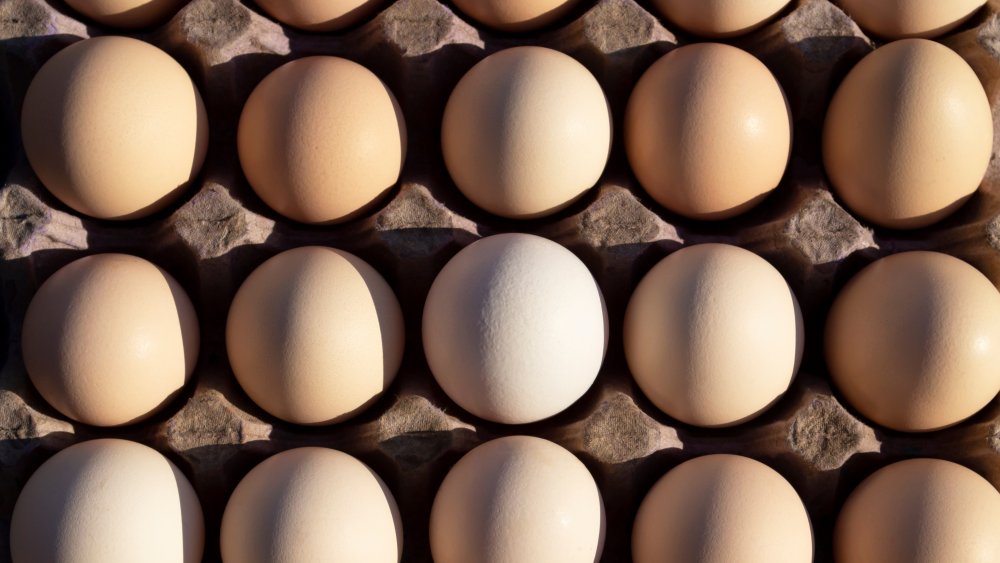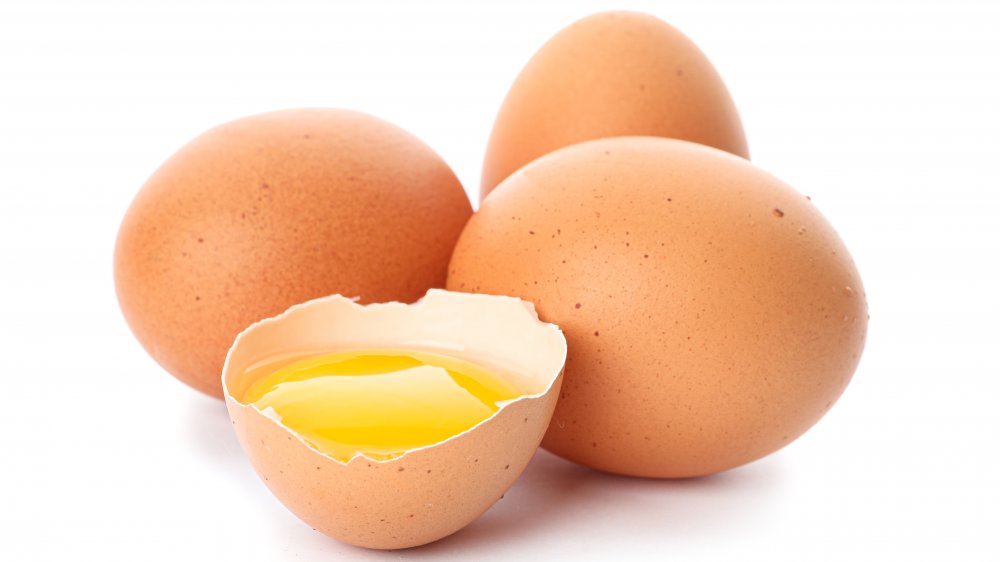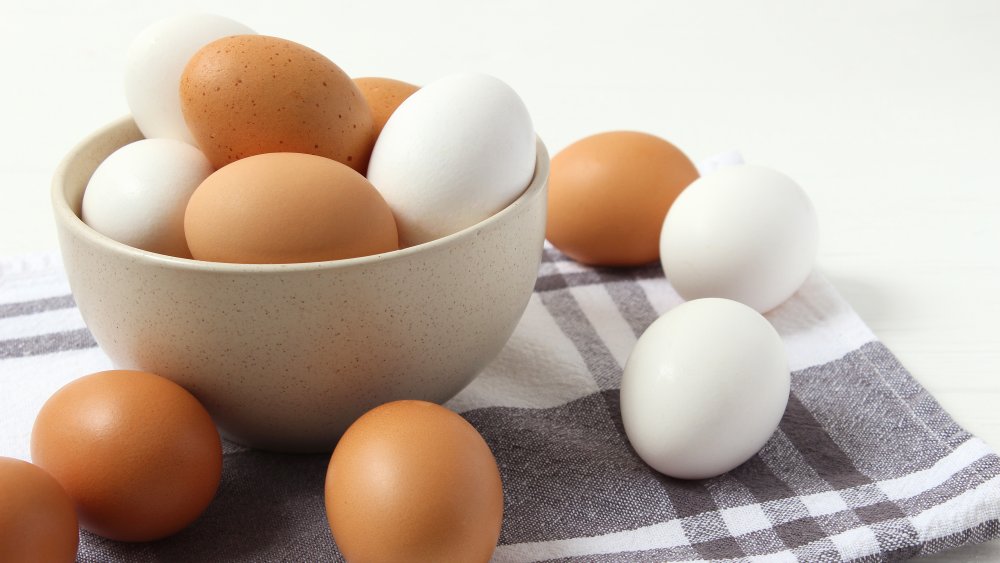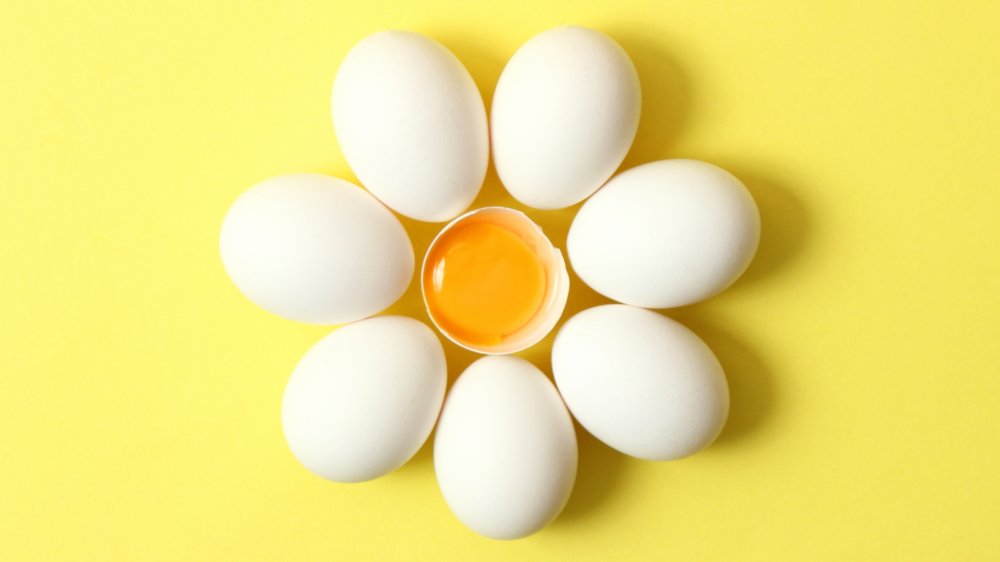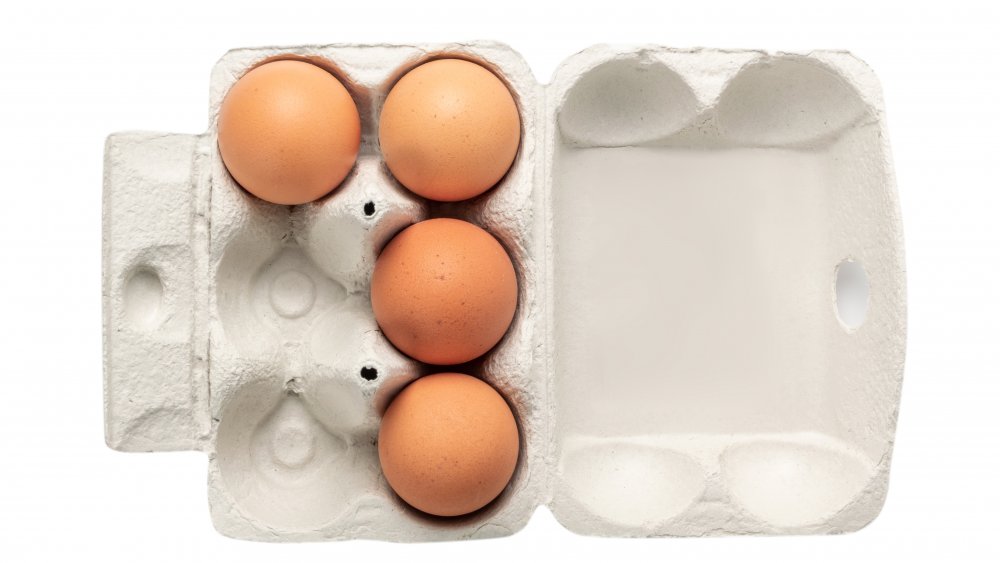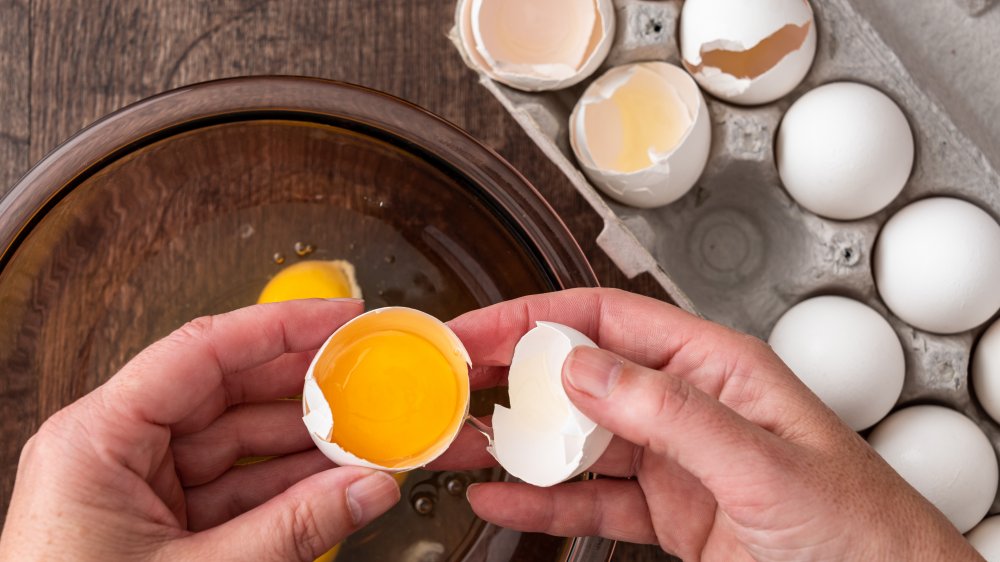Here's What Happens When You Eat Eggs Every Day
Eggs are a staple in a large number of world cuisine and chances are, if do not have an allergy to eggs, you probably consume a lot of them. That's because apart from being eaten on their own in scrambles at breakfast, hard boiled in lunch salads, and in quiches for dinner, eggs are present in a number of prepared foods from ice cream, to mayonnaise, to baked goods, to fresh pastas. However, in foods such as these, the amount of egg used can be negligible and the nutrients contained in eggs (or their potential health drawbacks) likely won't affect your body in any significant or considerable way.
If you're eating a large number of eggs straight up, perhaps every day, whether they are fried, poached, scrambled, or boiled, you may start to see benefits from the many nutrients contained in them, as well as noticing some of the less desirable health effects.
If you eat eggs every day, your cholesterol may be affected
As with many animal products, eggs are a great source of protein, but they also are high in cholesterol (via Mayo Clinic). A hard-boiled egg contains around 200 milligrams of cholesterol (via WebMD) and dietary guidelines suggest that people keep their intake of cholesterol under 300 milligrams every day. That being said, the cholesterol in eggs does not seem to be as detrimental to health as that from other sources, and according to Healthline, how eggs impact blood cholesterol varies person to person. Eggs may even help raise good cholesterol levels.
Still, researchers and health officials have gone back and forth about the effects that cholesterol has in the human body.In 2015, the U.S. dietary guidelines seemed to back off on its warning against cholesterol, and the American public took note, consuming more eggs last year than at any point in the last two decades. However, more recently the advice has changed and eggs are problematic again.
Researchers and doctors understand that the back and forth on the eggs and the cholesterol contained in them is frustrating. "We're sorry it's so confusing. One day you have this news. Another day you have that news. It's horrible, and I totally sympathize," said Leslie Cho, MD, director of the women's cardiovascular center at the Cleveland Clinic in Ohio. However, she made it pretty simple as well: "The totality of evidence is pretty clear. Eat mostly vegetables and try to limit the amount of saturated fat and dietary cholesterol."
If you eat eggs every day, you'll get your share of choline
Eggs are a good source of an essential nutrient that many people don't get enough of — choline (via The National Institute of Health). Choline, which benefits people in similar ways to B vitamins, helps in regulating liver function, impacts the development of the brain, aids in muscle growth and movement, and helps in controlling the nervous system, and metabolism. The recommended daily intake of choline for adult men is 550 milligrams daily and for women the recommendation is 425 milligrams daily. An egg contains around 160 milligrams of choline, however you're not going to get a bit of choline if you're eating an egg white omelette; it's is concentrated entirely in the yolk (via Australian Eggs).
If you eat eggs every day, your eyes will thank you
The yolk of the egg contains lutein and zeaxanthin, which are antioxidants that help to slow down the age-related degeneration of the human eye. Studies have found that consumption of lutein and zeaxanthin has been associated with a decrease in the risk of cataracts and macular degeneration, a condition which affects primarily the older population, and causes blurriness in the central field of vision (via All About Vision). A study showed that the consumption of 1.3 egg yolks daily for just over a month resulted in an increase of lutein in the body by between 28 to 50 percent and zeaxanthin by 114 to 142 percent.
Eggs are also full of vitamin A, which is one of the most important components of healthy eye function. A deficiency in vitamin A is the world's leading cause in preventable childhood blindness (via World Health Organization).
Eating eggs every day can be good for your bones, but there's a catch
Good news yolk lovers — there's another valid excuse to keep those bright orange orbs in your pan. Just as choline is contained only in the egg yolks, so is vitamin D, and according to Healthline, vitamin D can help improve bone health. While a typical egg yolk contains about 5 percent of your daily need, Healthline also reports that pasture-raised chickens who get their fair share of sunlight can produce eggs that contain as much as three to four times more vitamin D. If that's not incentive to seek out eggs from pasture-raised chickens, we don't know what is.
Eating eggs every day can reduce your stress levels
If you've been feeling stressed out, starting a daily egg eating habit could be a natural way of keeping your stress levels in check. Eggs just so happen to be packed with vitamin D which, as Health's contributing nutrition editor Cynthia Sass told the outlet, "is linked to several important health benefits, including better immune function, anti-inflammation, and mood regulation, including reducing symptoms of depression."
Vitamin D isn't the only thing in eggs that can help you lower your stress levels. Nutritionist Keri Gans told the outlet that eggs also have a chemical called acetylcholine, which acts as a neurotransmitter in the brain. Acetylcholine may have an impact on a person's ability to regulate their mood, which in turn may make it easier to manage stress levels if you're getting a daily dose of eggs in your diet. Who knew that eggs could have such a calming effect?
Eating eggs every day can give you a beauty boost
Eating eggs every day might just might become part of your beauty routine once you learn of all of the things they can do. Per Healthline, eggs are a source of protein and biotin, both of which may promote hair growth. A diet rich in protein is critical for healthy hair growth, since your hair follicles are mostly made up of protein. Eggs are good for your hair even if you don't ingest them — the outlet also noted that using egg yolks as a hair mask can also be a powerful moisturizer.
While Self recommended not following DIY face masks recipes that call for using raw eggs as accidentally ingesting them can lead to salmonella, eating cooked eggs can be great for your skin. Per BBC Good Food, eggs are loaded with an antioxidant called selenium which can help protect your skin from skin cancer, sun damage, and age spots. According to Medical News Today, eggs are also rich in vitamins and minerals which may promote skin health.
